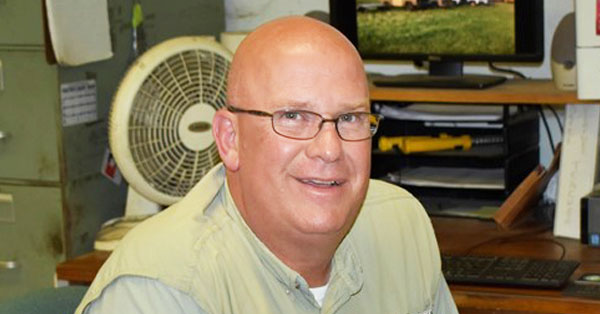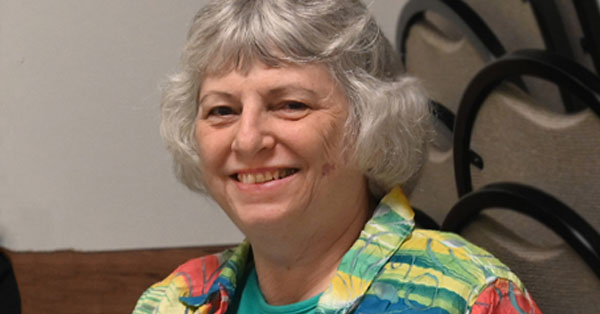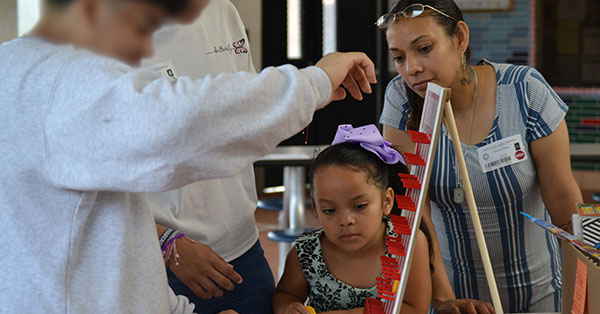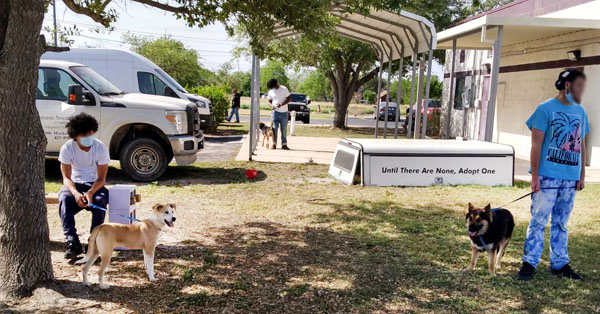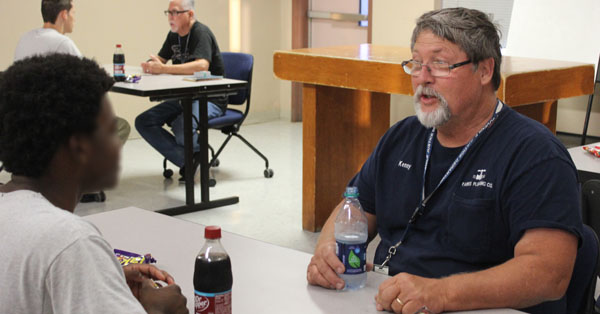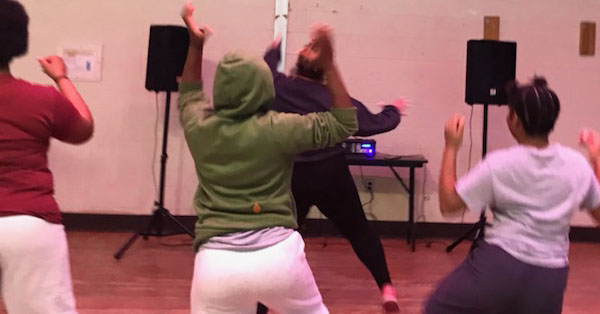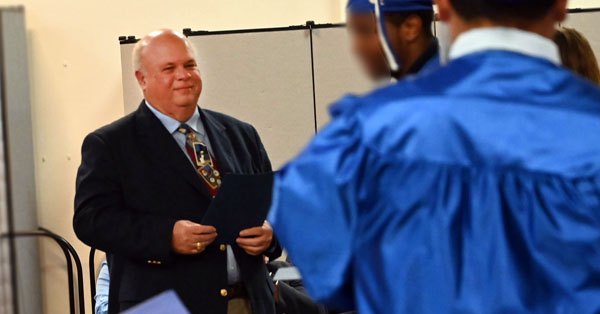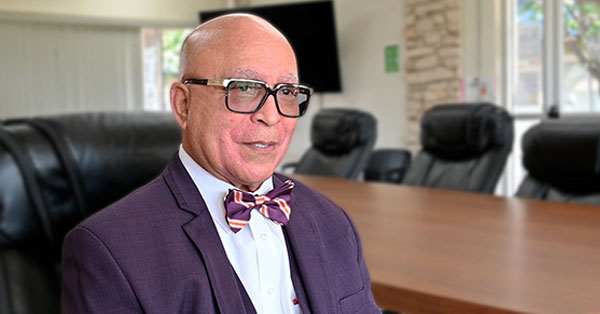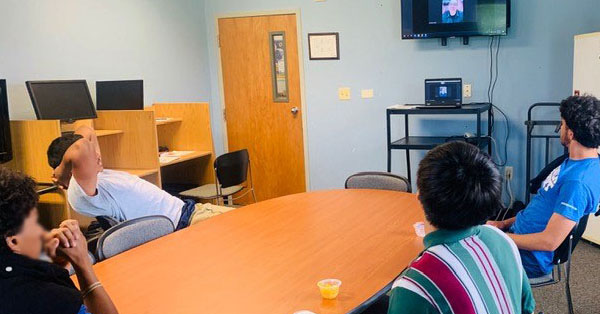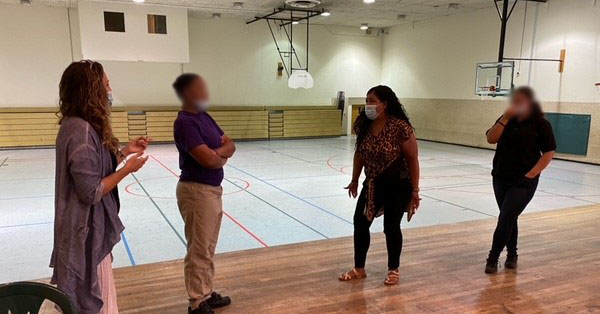- TJJD highlights parole and probation officer stories for 2024 Pretrial, Probation and Parole Supervision WeekBy David Krough, TJJD Communications and Kevelle Wasson, volunteer services coordinator for parole Deborah Linder – TJJD Parole Officer By David Krough, TJJD Communications Deborah Linder started with TJJD in… Read more: TJJD highlights parole and probation officer stories for 2024 Pretrial, Probation and Parole Supervision Week
- Beryl projected to strengthen to hurricane, make landfall on Texas’s midcoastBy TJJD Communications Texans are urged to make final preparations in advance of the Tropical Storm Beryl likely strengthening to a hurricane and making landfall along the central Texas coast… Read more: Beryl projected to strengthen to hurricane, make landfall on Texas’s midcoast
- Longtime Mart campus warehouse inventory specialist Jerry Forrest to hang up his CAPPSBy David N. Krough, Communications Specialist After overseeing massive changes at TJJD/TYC over 23 years, Jerry Forrest is moving on. Forrest, Inventory and Store Specialist, started at the McLennan County… Read more: Longtime Mart campus warehouse inventory specialist Jerry Forrest to hang up his CAPPS
- Former TYC youth finds success at Houston colleges with the help of TJJD scholarship trust fundBy Barbara Kessler, TJJD Communications In her late teens, Hope C. recalls that she felt like a “lost soul.” She had been at a Texas Youth Commission facility where she’d… Read more: Former TYC youth finds success at Houston colleges with the help of TJJD scholarship trust fund
- Former TJJD youth J.M. graduates with an associate’s nursing degree; credits TJJD trust fund scholarshipBy David N. Krough, TJJD Communications It is whispered among those tasked with guarding the security and safety of the public that the biggest successes remain silent, while the smallest… Read more: Former TJJD youth J.M. graduates with an associate’s nursing degree; credits TJJD trust fund scholarship
- JCOs tell about their rewarding careers helping youth and ensuring community safetyBy David Krough, TJJD Communications JCO Brandon Thibodeaux Juvenile Correctional Officer Brandon Thibodeaux started working at Giddings State School in the Capital Offender dorm in 2015. “I came to Giddings… Read more: JCOs tell about their rewarding careers helping youth and ensuring community safety
- TJJD leaders tour modern youth facilities in OregonBy Barbara Kessler, TJJD Communications This past week, TJJD Executive Director Shandra Carter and a group of TJJD leaders toured two youth facilities in Oregon in preparation for the construction… Read more: TJJD leaders tour modern youth facilities in Oregon
- What does it take to build a successful career at TJJD? Mart’s Terry Williams’ storyBy Barbara Kessler, TJJD Communications Honest. Trustworthy. Dependable. Epically patient. These are the qualities Terry Williams’ colleagues call out when they consider why he’s been so successful in his career… Read more: What does it take to build a successful career at TJJD? Mart’s Terry Williams’ story
- TJJD hosts mental health expert who stresses wellness care for corrections staff at all levelsBy David Krough, TJJD Communications Addressing the need to maintain mental health for those who work in corrections is an obvious necessity – but somewhere between employees on the front… Read more: TJJD hosts mental health expert who stresses wellness care for corrections staff at all levels
- The ‘Book Club Men’ are leaning into literature at Giddings State SchoolBy David N. Krough, TJJD Communications Specialist The Giddings State School Book Club 2.0 is off and reading this spring, poring through stories of challenge and determination – by characters… Read more: The ‘Book Club Men’ are leaning into literature at Giddings State School
- Young welders at TJJD schools fired up to fill a growing nicheBy David N. Krough, TJJD Communications The American Welding Society declared April as National Welding Month – and students across TJJD campuses are honing their skills in what is an… Read more: Young welders at TJJD schools fired up to fill a growing niche
- Mart’s Jason Tweedle is a natural in his new role as DBT Implementation LeaderBy Barbara Kessler, TJJD Communications Jason Tweedle found his calling when he signed up to work as a Juvenile Correctional Officer at the McLennan County State Juvenile Correctional Facility 24… Read more: Mart’s Jason Tweedle is a natural in his new role as DBT Implementation Leader
- TJJD Regionalization Task Force welcomes new members with valuable perspectiveBy Barbara Kessler, TJJD Communications Two new voices have joined the TJJD Regionalization Task Force, bringing a fresh perspective and expanded dimension to the task force’s efforts to strengthen diversion… Read more: TJJD Regionalization Task Force welcomes new members with valuable perspective
- Dallas Pets Alive and TJJD BARK providing a warm and furry public serviceBy TJJD Communications Dallas Pets Alive and Texas Juvenile Justice Department have solidified a unique partnership that’s helping dogs in need of temporary fostering care while saving their owners from… Read more: Dallas Pets Alive and TJJD BARK providing a warm and furry public service
- TJJD youth pony up a great gift to Ronald McDonald House of Central TexasBy Barbara Kessler, TJJD Communications Lone Star High School Southeast completed a months-long community service project to help kids in medical crisis with the delivery on Friday of a small… Read more: TJJD youth pony up a great gift to Ronald McDonald House of Central Texas
- Non-essential staff have delayed start Tuesday, Jan. 16, 2024Due to the current winter weather event, all non-essential staff at TJJD will be on a delayed start time until 12 pm (noon), tomorrow January 16, 2024. (Please use the CAPPS code… Read more: Non-essential staff have delayed start Tuesday, Jan. 16, 2024
- Governor’s Office Appoints Nine to TJJD BoardBy TJJD Communications We’re excited to announce that on Tuesday, Dec. 19, the Office of the Governor appointed nine members to TJJD’s newly structured governing board. The new nine-member board will… Read more: Governor’s Office Appoints Nine to TJJD Board
- Rosales and Quiroga make an inspiring and effective team at EvinsBy TJJD Communications It almost sounds like a Hollywood “buddy movie.” Two longtime friends and coworkers with more than 40 years of service to their community. One day, one of… Read more: Rosales and Quiroga make an inspiring and effective team at Evins
- New education complex opens at Lubbock County Juvenile Justice CenterBy TJJD Communications The Lubbock County Juvenile Justice Center unveiled its new Education Complex on Tuesday, showcasing the building’s 10 classrooms, indoor recreation center and office suite for the Lubbock… Read more: New education complex opens at Lubbock County Juvenile Justice Center
- Attorney Leah O’Leary joins TJJD to help smooth and improve Level II hearings processBy TJJD Communications TJJD staff at secure facilities and halfway houses strive to help youth make better decisions and correct poor behavior. But, as at any place with troubled teens,… Read more: Attorney Leah O’Leary joins TJJD to help smooth and improve Level II hearings process
- Youth learn horticulture and woodworking skills at the Evins campusBy TJJD Communications At secure facilities and halfway houses throughout TJJD, members of the education staff consistently strive to identify opportunities for the youth to acquire valuable trades, enhancing their… Read more: Youth learn horticulture and woodworking skills at the Evins campus
- ESP program in Tom Green County is a long-standing successBy TJJD Communications It started as a simple enough idea: to create a program for young people going through difficult times in their lives to learn ways to cope and… Read more: ESP program in Tom Green County is a long-standing success
- A new program at Gainesville State School teaches trust, responsibility and spreads yappiness to allBy Barbara Kessler, TJJD Communications Gainesville State School’s newest resident bounded onto campus full of energy. She rushed to meet everyone that first day, searched every face for responses and… Read more: A new program at Gainesville State School teaches trust, responsibility and spreads yappiness to all
- New Achieve program focuses on lower-risk TJJD youth, offering a structured, quicker pathway homeBy Barbara Kessler, TJJD Communications The profile of youth who come to TJJD is changing. The agency is serving more highly violent offenders – those referred for homicides, attempted homicides,… Read more: New Achieve program focuses on lower-risk TJJD youth, offering a structured, quicker pathway home
- Lots of smiles and tears as longtime Mart staffer Lisa McNeil retiresBy TJJD Communications For Lisa McNeil, her retirement has brought a powerful mixture of emotions. For more than 25 years, the woman nicknamed “Sunshine” by her peers and coworkers has… Read more: Lots of smiles and tears as longtime Mart staffer Lisa McNeil retires
- Focus group asks TJJD youth who’ve been through the Capital Offender program how to make it betterBy TJJD Communications TJJD researchers conducted focus group meetings with youth at the Giddings State School this month. The purpose was to get feedback from youths who had completed the therapeutic… Read more: Focus group asks TJJD youth who’ve been through the Capital Offender program how to make it better
- Ron Jackson’s Lone Star HS ‘Graduation Wall’ allows youth expression, leaves a bright imprintBy Barbara Kessler, TJJD Communications Mosey down the main hallway at Lone Star High School West, at TJJD’s Ron Jackson campus, and you’ll be stopped by a splash of colors… Read more: Ron Jackson’s Lone Star HS ‘Graduation Wall’ allows youth expression, leaves a bright imprint
- Gainesville State School and Supt. Darryl Anderson hitting positive milestonesBy Barbara Kessler, TJJD Communications Gainesville State School Superintendent Darryl Anderson and his campus find themselves in a happy place this fall. Anderson visited Austin in August to attend the… Read more: Gainesville State School and Supt. Darryl Anderson hitting positive milestones
- Two members of TJJD team accepted to Governor’s Executive Development ProgramBy TJJD Communications TJJD is proud to announce that two of our own have been selected to participate in the Governor’s Executive Development Program (GEDP) at the University of Texas… Read more: Two members of TJJD team accepted to Governor’s Executive Development Program
- Football coaches team-up for a winning yearBy TJJD Communications The Lone Star High School Southeast football team is off to a start that’s almost as sizzling hot as the weather. While the young men on the… Read more: Football coaches team-up for a winning year
- Director of Probation Services Amy Miller is retiring, but her heart will always be in juvenile justiceBy James Bateman, TJJD Probation Services Amy Miller began her career with the agency in 2002 as a case manager at the Corsicana Residential Treatment Center working with female offenders… Read more: Director of Probation Services Amy Miller is retiring, but her heart will always be in juvenile justice
- Tina Saenz Retires from TJJD after 30 years of invaluable serviceBy TJJD Communications On August 31, Tina Saenz will be calling it a day. Her well-earned retirement will be a bittersweet occasion for the staff and youth at the Evins… Read more: Tina Saenz Retires from TJJD after 30 years of invaluable service
- Rachel Gandy joins the agency as Chief of StaffBy TJJD Communications This summer TJJD welcomed Rachel Gandy as the agency’s new Chief of Staff. Gandy replaces Sean Grove, who has been promoted to Deputy Executive Director and will… Read more: Rachel Gandy joins the agency as Chief of Staff
- Expansive TJJD Capstone project brings treatment and case management innovationsBy Barbara Kessler, TJJD Communications This summer a group of TJJD leaders kicked off a special program for the agency that aims to improve cohesivity, working conditions, youth engagement and… Read more: Expansive TJJD Capstone project brings treatment and case management innovations
- At Gainesville, Family Days are here againBy TJJD Communications The Gainesville State School once again held its popular event, Family Days, on June 24 and 25. The students of the school their families to come and… Read more: At Gainesville, Family Days are here again
- Wharton County community alliance helps kids believe ‘Yes We Can’By TJJD Communications TJJD and juvenile probation departments in counties across the state rely on partnerships within our communities to help better serve their young people. In the case of… Read more: Wharton County community alliance helps kids believe ‘Yes We Can’
- Longtime TJJD secure facilities and Texas Model leader Tom Adamski retiring after 25 yearsBy Barbara Kessler, TJJD Communications TJJD Director of the Texas Model Tom Adamski doesn’t plan to spend his retirement writing a history of the agency. But he certainly could. Adamski,… Read more: Longtime TJJD secure facilities and Texas Model leader Tom Adamski retiring after 25 years
- Spotlight On: Ruben Trevino of Tamayo Halfway HouseBy Barbara Kessler, TJJD Communications The minute Ruben Trevino picks up the phone, we are fast into a discussion about a mutually beneficial relationship with a community group that is… Read more: Spotlight On: Ruben Trevino of Tamayo Halfway House
- TJJD hosts Power Source training for Texas juvenile justice treatment professionalsBy TJJD Communications TJJD hosted nearly 100 treatment professionals from TJJD campuses and Juvenile Probation Departments across Texas for two days of trainings in Power Source, a sought-after treatment modality.… Read more: TJJD hosts Power Source training for Texas juvenile justice treatment professionals
- Hidalgo County Family Empowerment Program helps parents improve relationships & communication with their child in placement and the siblings at homeBy Barbara Kessler, TJJD Communications EDINBURG, Texas – If you’re a parent you know that discussing parenting techniques and quandaries with others can be a minefield. For every issue confronting… Read more: Hidalgo County Family Empowerment Program helps parents improve relationships & communication with their child in placement and the siblings at home
- Celebrating our staff on National Correctional Officers WeekThis National Correctional Officers Week we hope everyone enjoyed the lunches, tchotchkes, reusable water bottles, treats and general celebrations that Superintendents and many others put together to honor staff this… Read more: Celebrating our staff on National Correctional Officers Week
- Patty Garza has one of the ‘best jobs’ at TJJD coordinating interns, volunteers and parole programs for the South RegionBy TJJD Communications For a lot of us, it can be easy to forget how big the state of Texas is. This isn’t a problem for Patty Garza, the Community… Read more: Patty Garza has one of the ‘best jobs’ at TJJD coordinating interns, volunteers and parole programs for the South Region
- UNT Health Science Center nursing students present drug abuse program and spend time with youth at Gainesville State SchoolBy Kevin Hill, Volunteer Coordinator, Gainesville State School Gainesville State School hosted a drug and alcohol awareness seminar recently conducted by the Correctional Medicine Interest Group (CMIG) from University of… Read more: UNT Health Science Center nursing students present drug abuse program and spend time with youth at Gainesville State School
- Ayres House youth listen to and feel the sound of calm during a ‘sound bath’By TJJD Communications The staff and volunteers at our facilities are always looking for new ways to help the youth in our care learn to regulate their emotions. Recently, the… Read more: Ayres House youth listen to and feel the sound of calm during a ‘sound bath’
- TJJD Parole Manager Don Finley says parole staff must listen well and demonstrate empathyBy TJJD Communications Don Finley has learned many things in over 25 years serving Texas youth, but when asked what the most important part of the job is, he gave… Read more: TJJD Parole Manager Don Finley says parole staff must listen well and demonstrate empathy
- TJJD Nutritionist Sarah Wall enjoys crafting modern menus for young people and urges parents to keep trying the broccoliBy TJJD Communications As a “foodie at heart,” Sarah Wall loves working on the menus at TJJD. “It’s kind of like working on a puzzle, doing it for the kids… Read more: TJJD Nutritionist Sarah Wall enjoys crafting modern menus for young people and urges parents to keep trying the broccoli
- This National Volunteer Month TJJD salutes the dozens of volunteers who share their time and skills with TJJD youthBy TJJD Communications Martin Luther King, Jr. said “Everybody can be great because everybody can serve.” This especially comes to mind right now as April is National Volunteer Month. VolunteerMonth… Read more: This National Volunteer Month TJJD salutes the dozens of volunteers who share their time and skills with TJJD youth
- Giddings State School showcases student accomplishments at Open House and Family DayBy TJJD Communications The Giddings State School was proud to host an Open House and Family Day at the campus on Saturday, March 25. Family and loved ones spent time… Read more: Giddings State School showcases student accomplishments at Open House and Family Day
- Jennifer Brown embraces her mentoring role as assistant superintendent at Gainesville State SchoolBy Barbara Kessler, TJJD Communications Jennifer Brown has always embraced challenges, both in her earlier career as a teacher and principal, and since coming to TJJD in 2020 where she… Read more: Jennifer Brown embraces her mentoring role as assistant superintendent at Gainesville State School
- Evins Campus Volunteers Faithfully Serve Youth and Their Families with Meals, Events and DonationsBy Fidel Garcia, Community Volunteer Coordinator, Evins Regional Juvenile Center Last month, the Volunteer Council serving the Evins campus, in Edinburg, sponsored an Easter family event and helped a family… Read more: Evins Campus Volunteers Faithfully Serve Youth and Their Families with Meals, Events and Donations
- Spotlight On: Monica Harrison, Manager of Operations, Giddings State SchoolBy TJJD Communications Everyone who excels in their work has their own style, their own approach to how they go about it. What Monica Harrison brings to the job is… Read more: Spotlight On: Monica Harrison, Manager of Operations, Giddings State School
- Dr. Henry Schmidt joins TJJD as Director of Structured Programming and AccountabilityBy Barbara Kessler, TJJD Communications Texas Juvenile Justice Department is pleased to welcome Henry Schmidt III, Ph.D., a former clinical director for Washington State’s Juvenile Rehabilitation Administration, as the agency’s… Read more: Dr. Henry Schmidt joins TJJD as Director of Structured Programming and Accountability
- Youth at Gainesville State School ‘bubbling with enthusiasm’ over new vocal program led community volunteersBy TJJD Communications Some talented and hard-working students at the Gainesville State School are getting the chance to express themselves in a creative and educational way with the launch of… Read more: Youth at Gainesville State School ‘bubbling with enthusiasm’ over new vocal program led community volunteers
- Spotlight On: Willie Brown, Supt. of Schaeffer HouseBy Barbara Kessler, TJJD Communications Willie Brown knows that seeing a brawny guy like him playing Barbie dolls would probably draw a chuckle. But that’s OK with him because he… Read more: Spotlight On: Willie Brown, Supt. of Schaeffer House
- Longtime TJJD Board member Jimmy Smith leaves a big legacyBy Barbara Kessler, TJJD Communications TJJD bid farewell and wished a happy retirement to longtime board member James “Jimmy” Smith at the last TJJD Board meeting, held in February. Smith… Read more: Longtime TJJD Board member Jimmy Smith leaves a big legacy
- Stichin for the Journey Group Delights Ayres Halfway House Youth with Donations of Handcrafted QuiltsBy Patty Garza, Community Relations & Family Coordinator, Ayres House and South Parole Ayres Halfway House, in San Antonio, has been blessed to partner with “Stichin for the Journey,” a… Read more: Stichin for the Journey Group Delights Ayres Halfway House Youth with Donations of Handcrafted Quilts
- TJJD’s Online Caregiver Training Series Resumes this Month, Helping Loved Ones with their Youth’s Transition HomeBy TJJD Communications Starting February 21, TJJD resumes its Texas Model Training for TJJD Youth Caregivers and Families. It’s an interactive training series that offers family and caregivers an overall… Read more: TJJD’s Online Caregiver Training Series Resumes this Month, Helping Loved Ones with their Youth’s Transition Home
- Carter and Team Visit Secure Facilities, Halfway Houses and Probation DepartmentsBy TJJD Communications Executive Director Shandra Carter, Chief of Staff Sean Grove and other TJJD leaders kicked off the new year by visiting all five secure facilities, where they met… Read more: Carter and Team Visit Secure Facilities, Halfway Houses and Probation Departments
- TJJD Youth Make and Donate Rocking Horses to Ronald McDonald House Charities of Central TexasBy TJJD Communications Working with the youth in our care, their success is measured in many ways. High on the list is when they can experience firsthand the importance of… Read more: TJJD Youth Make and Donate Rocking Horses to Ronald McDonald House Charities of Central Texas
- Gainesville Hosts Huge Family Day Event for ThanksgivingBy TJJD Communications Gainesville State School hosted a large and lively Family Day event for Thanksgiving, with dozens of families and youth enjoying a Chick-fil-A lunch donated by the Potter’s… Read more: Gainesville Hosts Huge Family Day Event for Thanksgiving
- Ayres House celebrates recent graduate who’s going on to collegeBy Barbara Kessler, TJJD Communications Many youths come to TJJD behind in school, often years behind grade level. That they were not focused on school is no surprise. Some spent… Read more: Ayres House celebrates recent graduate who’s going on to college
- Youth and educators collaborate to launch ‘The Mentoring Book Club’ at Giddings State SchoolBy TJJD Communications Books can be powerful things. Books can inform us, educate us, and motivate us. Books can make us curious enough to go around the world or take… Read more: Youth and educators collaborate to launch ‘The Mentoring Book Club’ at Giddings State School
- Gainesville campus mourns loss of longtime colleague, David JohnsonTJJD employees at Gainesville State School are mourning the loss of a longtime colleague, David Johnson, a well-respected campus staff member who was known for being a supportive team player.… Read more: Gainesville campus mourns loss of longtime colleague, David Johnson
- Giddings hosts Thanksgiving barbecue for youth and families, sponsored by church groupsBy Janet Sheelar, Volunteer Services Coordinator, Giddings State School Our Giddings campus hosted a huge Family Day event on Nov. 12, a Thanksgiving barbecue for the youth. Of the youth… Read more: Giddings hosts Thanksgiving barbecue for youth and families, sponsored by church groups
- An Outpouring of Support Encourages Giddings State School MustangsBy Tracey Walker, Assistant Principal, Lone Star High School Southeast, Giddings State School The Giddings State School has been having a heck of a football year, with some stops and… Read more: An Outpouring of Support Encourages Giddings State School Mustangs
- Giddings State School celebrates 50th AnniversaryBy TJJD Communications A lot can happen in 50 years. Changes both globally and locally. Shifts in cultural styles and how we live, and unimaginable leaps in technology. In the… Read more: Giddings State School celebrates 50th Anniversary
- Alaska invited TJJD clinicians to share expertise working with capital offendersBy TJJD Communications Last year a few staffers from Alaska’s Division of Juvenile Justice travelled to Texas to observe the Capital and Violent Offender Group program, also known as COG,… Read more: Alaska invited TJJD clinicians to share expertise working with capital offenders
- Tim Barr, vocational teacher who wore many hats, retires at Giddings State SchoolBy TJJD Communications The greatest testimony to the dedicated people who’ve made careers at our secure facilities is the difference they’ve made in the lives of TJJD youth. Today, we… Read more: Tim Barr, vocational teacher who wore many hats, retires at Giddings State School
- Accountant discovers that working at TJJD provides a path to college loan forgivenessBy Barbara Kessler, TJJD Communications Ashley Neamtz was determined to get her business degree and after that, get out from under the compounding debt that her hard-earned college education had… Read more: Accountant discovers that working at TJJD provides a path to college loan forgiveness
- San Antonio quilting group spreads the love, giving several handcrafted quilts to youth at Ayres Halfway HouseBy Barbara Kessler, TJJD Communications When service-minded people collaborate, it’s amazing what gets stitched together. In this case, it was stacks of beautiful quilts. Their makers recently delivered these mood-brightening,… Read more: San Antonio quilting group spreads the love, giving several handcrafted quilts to youth at Ayres Halfway House
- TJJD’s Business Director leaves the agency with fond memoriesBy Barbara Kessler, TJJD Communications Many of our TJJD staffers have wonderful career success stories to tell. They worked for many years at the agency and retired confident that they… Read more: TJJD’s Business Director leaves the agency with fond memories
- Tina Saenz discovered her life’s work at Evins Regional Juvenile CenterBy Fidel Garcia, Volunteer Resource Coordinator, Evins Regional Juvenile Center Looking back and reminiscing over 35 years of life is quite a task, let alone working those 35 years and… Read more: Tina Saenz discovered her life’s work at Evins Regional Juvenile Center
- Education Director Luther Taliaferro, who is retiring, brought a unique background and no-nonsense approach to the jobBy Barbara Kessler, TJJD Communications It probably won’t shock anyone to learn that TJJD’s Sr. Director of Education, Luther Taliaferro, promotes schooling as a key to success and harmonious reintegration… Read more: Education Director Luther Taliaferro, who is retiring, brought a unique background and no-nonsense approach to the job
- Giddings and Gainesville state school football teams are suited up and we’re so happy to see it!By TJJD Communications With apologies to the bluebonnets, Willie Nelson, and barbeque, nothing is more Texas than football. Two of TJJD’s facilities, Giddings State School and Gainesville State School, have… Read more: Giddings and Gainesville state school football teams are suited up and we’re so happy to see it!
- Dell Computer donation to TJJD brought electronic and human connectionsBy Barbara Kessler, TJJD Communications Dell Computer Corp. reached out to help youth at TJJD this summer, making a generous donation of 40 laptop computers, but contributing an even bigger,… Read more: Dell Computer donation to TJJD brought electronic and human connections
- Retiring JJAEP expert Marie Welsch lauds probation departments for hard work on behalf of kidsBy TJJD Communications When a valued part of the Texas Juvenile Justice Department community heads off into retirement, it’s always a bittersweet experience. We’re sad to see them go, but… Read more: Retiring JJAEP expert Marie Welsch lauds probation departments for hard work on behalf of kids
- Recruitment Manager Jim Espinoza loves helping people find their career niche at TJJDBy TJJD Communications The Texas Juvenile Justice Department is always working to recruit new staff for our secure campuses and halfway houses, and the best way to hire driven and… Read more: Recruitment Manager Jim Espinoza loves helping people find their career niche at TJJD
- TJJD Announces Pay RaisesThe Texas Juvenile Justice Department announced pay raises of 15 percent on Friday, July 8, to make TJJD salaries more competitive. This permanent pay raise, effective July 1, 2022, will… Read more: TJJD Announces Pay Raises
- Giddings State School celebrates its Spring 2022 graduates, hosts a special speaker who overcame the odds against himBy Janet Sheelar, Community Resource Coordinator, Giddings State School Giddings State School celebrated its students at the 2022 Spring Graduation, which featured a full gowned ceremony, a special speaker and… Read more: Giddings State School celebrates its Spring 2022 graduates, hosts a special speaker who overcame the odds against him
- BARK alert! Ron Jackson’s canine program gets a refresh with focus on building attachmentsBy Barbara Kessler, TJJD Communications TJJD is relaunching its canine program, with a new name, BARK, for Building Attachment & Resilience K9 Program. BARK kicked off at the Ron Jackson… Read more: BARK alert! Ron Jackson’s canine program gets a refresh with focus on building attachments
- Evins campus gathers families for a fun day of art activities, games and bingoBy Fidel Garcia, Volunteer Services Coordinator, Evins campus Seems like it was yesterday when TJJD families gathered at the Evins Regional Juvenile Center for a family day. But it was… Read more: Evins campus gathers families for a fun day of art activities, games and bingo
- TJJD youth typically experience high levels of Adverse Childhood Experiences (ACEs); mental health treatment can helpBy TJJD Communications TJJD youth often struggle with a background of trauma, which can be a big obstacle as they try to adopt more positive behaviors, complete their education and… Read more: TJJD youth typically experience high levels of Adverse Childhood Experiences (ACEs); mental health treatment can help
- Meet these inspiring TJJD staffers this National Correctional Officers WeekBy TJJD Communications This first week of May is National Correctional Officers Week, when we salute TJJD’s hard-working direct care professionals. At the top of that list are our Youth… Read more: Meet these inspiring TJJD staffers this National Correctional Officers Week
- Tamayo youth clean kennels, bond with dogs and earn appreciation at Harlingen Humane SocietyBy Pedro Lozano, Youth Development Coach, Tamayo Halfway House It has been said that dogs are man’s best friend and that the bond between man and dog can be instantaneous.… Read more: Tamayo youth clean kennels, bond with dogs and earn appreciation at Harlingen Humane Society
- My Brother’s Keepers honored for a decade of service to Evins Regional Juvenile CenterBy TJJD Communications For more than a decade, a dedicated group of volunteers from First Baptist Church in Edinburg, called “My Brother’s Keepers,” served TJJD’s Evins campus, mentoring youth and… Read more: My Brother’s Keepers honored for a decade of service to Evins Regional Juvenile Center
- Texas Model Training for Caregivers and Families ResumesWeekly sessions will share Texas Model techniques with families & caregivers By TJJD Communications On the evening of Tuesday, January 11, at 6 pm, a small group of parents and… Read more: Texas Model Training for Caregivers and Families Resumes
- Zumba Brings Dance Fever to Ron JacksonBy TJJD Communications Lucinda Martinez will tell you straight away that the best part of her job is that it’s different every day. “It never gets boring,” says the 12-year… Read more: Zumba Brings Dance Fever to Ron Jackson
- Giddings State School’s new Mustang Alley offers fun and games, and a challengeBy Barbara Kessler, TJJD Communications, and Janet Sheelar, Volunteer Coordinator, Giddings State School Giddings State School has a long, strong tradition of offering athletic programs and academic and vocational classes… Read more: Giddings State School’s new Mustang Alley offers fun and games, and a challenge
- Mart Community Coordinator Tanya Rosas retires, reflects on how volunteers help TJJD youthBy Barbara Kessler, TJJD Communications When Tanya Rosas worked as an activities director for a nursing home in Marlin, she recruited volunteers of all ages to help engage the residents.… Read more: Mart Community Coordinator Tanya Rosas retires, reflects on how volunteers help TJJD youth
- Mart campus employees mourn loss of Marcus “Big Moe” Smith, a 26-year TJJD employeeBy TJJD Communications The TJJD community lost a beloved, tenured employee last week when Marcus Jerome Smith, a Youth Development Coach at the McLennan County campus, in Mart, passed away… Read more: Mart campus employees mourn loss of Marcus “Big Moe” Smith, a 26-year TJJD employee
- Dennis Smith leaves a legacy of strong leadership at Giddings’ Lone Star HSBy Barbara Kessler, TJJD Communications Dennis Smith, a steady, compassionate leader at Giddings State School for more than two decades, retired last week as principal at Lone Star High School… Read more: Dennis Smith leaves a legacy of strong leadership at Giddings’ Lone Star HS
- TJJD Supt. Bill Parks, leading by example and connecting with youthBy Barbara Kessler, TJJD Communications You notice first the Stetson, then the colorful suit, the bow tie and smooth dress shoes. The man so carefully attired is standing in military… Read more: TJJD Supt. Bill Parks, leading by example and connecting with youth
- Workforce team at Ayres House helps youth get on trackBy Barbara Kessler, TJJD Communications They aspire to be barbers, oil field technicians and game wardens. Some want jobs to help them pay their way through college. Some want to begin… Read more: Workforce team at Ayres House helps youth get on track
- Getting to your goals: TJJD’s top lawyer on his amazing Grand Canyon adventure, facing adversity and building resilienceBy Barbara Kessler, TJJD Communications At TJJD, you probably know General Counsel Christian von Wupperfeld as the attentive leader of the legal department and top advisor to the agency’s executives… Read more: Getting to your goals: TJJD’s top lawyer on his amazing Grand Canyon adventure, facing adversity and building resilience
- All the stage is a world of opportunity at TJJD’s Ron Jackson campusBy Barbara Kessler, TJJD Communications Like every other veteran employee at the Ron Jackson State Juvenile Correctional Complex, in Brownwood, Daniel Nix must have walked past the stage in the… Read more: All the stage is a world of opportunity at TJJD’s Ron Jackson campus
- Gainesville State School launches Pink Shirt WednesdaysBy TJJD Communications Over the past two years, the world has been focused on the coronavirus. But that other “Big C” continues to afflict Americans in large numbers even as… Read more: Gainesville State School launches Pink Shirt Wednesdays
- Ron Jackson campus helps girls with a fresh look for heading homeBy Barbara Kessler, TJJD Communications After working several years in case management at TJJD’s Ron Jackson campus, Sheri Coutee knew that many of the youth had multiple needs. They needed… Read more: Ron Jackson campus helps girls with a fresh look for heading home
- Cafe Momentum sets the table for expansion of its culinary program serving at-risk teensBy Barbara Kessler, TJJD Communications In 2015, Dallas Chef Chad Houser opened Café Momentum, an upscale restaurant unlike any other in Dallas or anywhere. It was completely staffed by teens… Read more: Cafe Momentum sets the table for expansion of its culinary program serving at-risk teens
- TJJD clinicians get training in the Neurosequential Model of TherapeuticsBy Barbara Kessler, TJJD Communications TJJD is expanding its therapeutic program by providing training for selected mental health professionals in an approach known as the Neurosequential Model of Therapeutics. NMT,… Read more: TJJD clinicians get training in the Neurosequential Model of Therapeutics
Contact Information
Barbara Kessler
Communications Director
(512) 490-7016
barbara.kessler@tjjd.texas.gov
Web Design & Administration
webmaster@tjjd.texas.gov
Public Information Requests
open.records@tjjd.texas.gov




































































